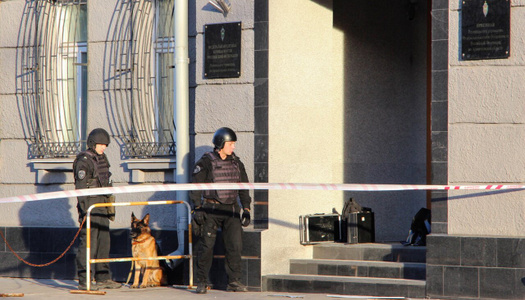
Fact check: Russia’s Security Council secretary says there was only one terrorist act in the country last year. Is he right?
Мы рассказываем честно не только про войну. Скачайте приложение.
The claim
“Terrorist activity in this country has decreased by more than 20 times over the course of five years. In 2018, five crimes motivated by terror and one terrorist act were committed in this country. This decrease in the threat of terror is related to the meticulous work of special services and law enforcement in our country, which has resulted in the prevention of 36 crimes motivated by terror as well as 20 terrorist attacks,” said Nikolai Patrushev, the secretary of Russia’s Security Council, in an interview with The Russian Gazette. Patrushev believes these statistics demonstrate that Russia is in a more stable situation than Europe, where “terrorist activity has increased.”
Officially, there really was only one terrorist attack in Russia last year
Patrushev did not say which attack he was talking about, but it is obvious that he was referring to an October 31 explosion in the FSB’s local headquarters in Arkhangelsk. The office of the Russian Attorney General has published statistics showing that within the first 11 months of 2018, the only successful terror attack to take place in Russia was reported in Arkhangelsk Oblast.
At least two more terrorism cases were reclassified
The best-known case in which a terrorist attack was reclassified under a different statue in Russian law was a shooting at Kerch Polytechnic College. Vladislav Roslyakov, a student at the college, triggered several improvised explosive devices there and fired at those who remained inside. Twenty people were killed as a result of the attack, and more than 40 were injured. Roslyakov committed suicide after the shooting.
In the hours following the attack, Russia’s Investigative Committee brought forward terrorism charges. However, after law enforcement determined the attacker’s identity, the Committee reclassified its investigation under a different statute that governs the murder of two or more people. The Committee wrote that its decision was based on “the general picture of the crime.”
A second terrorism case appears in the Attorney General’s statistics in September, but it is missing from the documents provided in subsequent months. On September 19, the Investigative Committee charged a man with threatening terrorism, which is equivalent to committing a terrorist act under Russian law, after he threatened the crew of a flight from Moscow to Vladivostok. At the time, the Committee announced in a press release that the suspect “threatened members of the crew with physical violence and threatened to blow up the airplane.”
In December, it became clear that the passenger’s case had in fact been investigated under a hooliganism statute. By that point, the Investigative Committee no longer mentioned his threat to set off an explosive device on board the flight. Investigators determined that the man was mentally ill and requested that the court sentence him to mandatory treatment.
The rate of other crimes “motivated by terror” has not decreased
Patrushev said that “terrorist activity [in Russia] has decreased by more than 20 times over the course of five years.” In fact, 661 crimes “motivated by terror” were reported in 2013 compared with 1566 in the first 11 months of 2018. Of those, only 848 cases addressed crimes that were committed on Russian territory, but that is still more than the number reported five years ago. “Crimes motivated by terror” include terrorist crimes that fall under Article 205 of Russia’s criminal code (“Terrorist Acts”) and its amendments or a range of other laws related to terrorist activity.
Mikhail Zelensky
Translation by Hilah Kohen
(1) A bombing in Arkhangelsk
On October 31, a 17-year-old polytechnic student set off an improvised explosive device in the reception room of Arkhangelsk’s local FSB headquarters. The explosion killed him and injured three FSB employees.
(2) Unsuccessful terrorist attacks
Russian law recognizes a distinct category of “crimes left uncompleted,” which include both attempted crimes and preparations for breaking the law. In 2018, Russian prosecutors brought forward 16 cases to address “unfinished” terrorist attacks.